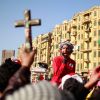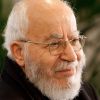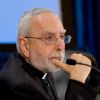Religion’s role in Arab Spring is promoting dignity, official says
VATICAN CITY - Religious communities can assist the North African and Middle Eastern pro-democracy movements by upholding human dignity and not trying to claim power for one religion or one movement within a religion, a senior Vatican official said.
Comboni Father Miguel Angel Ayuso Guixot, secretary of the Pontifical Council for Interreligious Dialogue, represented the Vatican at a conference in Istanbul Sept. 7-8 on “The Arab Awakening and Peace in the New Middle East: Muslim and Christian Perspectives.” He told participants at the conference that democracy presumes respect for human rights, including the right to freedom of religion and worship.
“In the growing efforts to enable democracy to take hold in the fabric of society in the Arab world, the hope is that it will lead to greater consideration of these basic rights,” Ayuso said.
A hopeful sign, he said, was the publication in January of a “bill of rights of basic liberties” by Muslim scholars at Al-Azhar University in Cairo. The document encouraged recognition of the freedoms of worship, opinion, scientific research and art and creative expression in new constitutions throughout the Arab world.
The 2011 Arab Spring movements led to democratic elections in Morocco, Tunisia and Egypt where Islam-inspired political parties won the most votes. The risk with democracy, Ayuso said, is that it “potentially could be used to legitimate extremist and fundamentalist ideologies,” which would make life difficult not only for the Christian minorities, but also for moderate Muslims.
The role of religion, he said, is to nourish an atmosphere of respect for all men and women created by God and endowed with equal dignity, rights and responsibilities.
Ayuso also spoke about the ongoing violence in Syria in his interview with Vatican Radio and at the conference. The Vatican’s diplomatic efforts in that case are focused on achieving a ceasefire, promoting a negotiated settlement, preserving Syria’s multiethnic and multireligious character and getting the Syrian government to recognize the international community’s legitimate interest in the conflict as a potential source of instability to the entire region, he told Vatican Radio.
He told the conference that Syrian Christians want to live in peace and harmony with their fellow citizens, but they are “naturally fearful that the growing violence, destruction and displacement, the continuing loss of life, endangers not just Christians, but all Syrians, regardless of their ethnicity or religion.”
“The specter of what happened to Christians in Iraq” once Saddam Hussein’s regime fell increases Syrian Christians’ fears, he said.
Building democracy harder than toppling dictators, Tunisian leader says
VATICAN CITY - Muslims and Christians throughout North Africa and the Middle East recognize that "building a democracy is more difficult than destroying a dictatorship," but they are committed to realizing their dream, said one of the leaders of change in Tunisia.
Rashid Ghannushi, known as the intellectual leader of Tunisia's Ennahda Movement, now the key party in the coalition governing Tunisia, was one of the speakers at a conference in Rome Feb. 29 on the Arab Spring movement.
Bishops see hope, fear, complexities in visit to Mideast Christians
JERUSALEM - Almost a year after the eruption of the Arab Spring uprisings, the Middle East is a place of hope and fear for Christians, said Bishop Gerald F. Kicanas of Tucson, Ariz.
Bishop Kicanas, chairman of the board of the U.S. bishops' Catholic Relief Services, was in Baghdad late last year and visited Egypt prior to his arrival in Jerusalem Jan. 8-12 for the annual Holy Land Coordination meeting with bishops from the United States, Canada and Europe.
"There is a fear among the Christians (in Egypt) whether they will be given human rights and whether they will be treated as equal citizens. There is a sense of wait and see," Bishop Kicanas told Catholic News Service Jan. 11.




